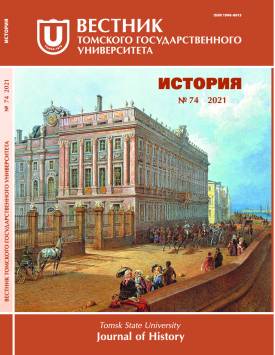J. Major in assessments of British society: yesterday and today
In the article highlights British public opinion on John Major, the 72nd Prime Minister of Great Britain (1990 to 1997). During his administration the UK joined the European Union; several steps were taken to resolve the conflict in Northern Ireland, etc. Today J. Major is an influential British politician. Seldom do Russian scientists conduct research on him. However, it has become relevant to address J. Major’s policy in connection with Brexit and the identification of the reasons for the lack of formation of the European identity among the British society and the establishment. The purpose of the study is to create an image of the politician based on British public opinion. The main sources to be applied are speeches, comments, articles and the autobiography of J. Major, materials of the UK Parliament and government, British media, public opinion polls, election results, and studies. The article focuses on some aspects of Major’s policy: the conditions of his becoming prime minister, the main directions of domestic policy, the measures regarding the European Exchange Rate Mechanism and the EU, the opposition represented by T. Blair, and steps taken to resolve the conflict in Northern Ireland. Research on J. Major’s policy was accompanied by the assessment of his actions by British society and establishment. From November 1990 to September 1992, the majority of British people were satisfied with both the work of J. Major and the Conservative Party. However, some politicians expressed disappointment at the involvement of the pound in the European Mechanism, and M. Thatcher publicly accused the successor of his rapprochement with the EU and the conclusion of the Maastricht Treaty. After September 16, 1992, when a sharp drop in the value of the pound sterling occurred, the rating of J. Major and the Conservative Party fell drastically. From September 1994 to November 1996, more than 60% of the British surveyed believed that the Conservatives were not trustworthy, and Major was being called “ineffective”. The conservative’s policy on the EU was not approved by British majority. J. Major sought to oppose the emergence of a European identity in the UK, but insisted on the need for European unification. It negatively affected public opinion on him. The political opponent T. Blair looked more determined and authoritative under the circumstances. Ultimately, it is concluded that today J. Major has a high rating among the British. The “Black Wednesday” of 1992 and the Tories’ policy towards the EU played a fatal role in his political image. The British saw a threat to their country in the integration and refused to be part of the EU. Nevertheless, during Major’s premiership, the economy began to recover, the Conservative Party was preserved, and positive results in resolving the Ulster Problem were achieved. However, the fruits of J. Major’s work in these areas appeared and were recognized by the British much later.
Keywords
John Major,
Maastricht Treaty,
European Union,
European identity,
Ulster problemAuthors
| Menshchikova Yulia V. | Tomsk State University | menshchikova.yu@mail.ru |
Всего: 1
References
Kavanagh D. John Major’s political legacy // OpenEdition Journals. 2009. URL: https://journals.openedition.org/osb/717?lang=en (accessed: 20.04.2020).
Major J. The Autobiography // ЛитРес : библиотека. М., 2020. URL: https://www.litres.ru/john-major/john-major-the-autobiography/(дата обра щения: 10.12.2020).
Бунькова Л.А. Опыт социального реформирования консервативных правительств Маргарет Тэтчер и Джона Мейджора в Великобритании // Вестник Нижневартовского государственного гуманитарного университета. 2008. № 3. С. 46-54.
Past Prime Ministers : Baroness Margaret Thatcher // GOV.UK. URL: https://www.gov.uk/government/history/past-prime-ministers/margaretthatcher (accessed: 29.09.2020).
Prime Minister’s Comments on the Maastricht Treaty : Press Release, 19 June 1992 // Sir John Major KG CH Prime Minister of Great Britain and Northern Ireland 1990-1997. 2020. URL: http://www.johnmajorarchive.org.uk/1990-1997/press-release-prime-ministers-comments-on-the-maastricht-treaty-19-june-1992/ (accessed: 16.11.2020).
Major premiership. Politics and Policies under John Major / еd. P. Dorey London : Palgrave Macmillan, 1999. 293 p.
Громыко Ал.А. Тони Блэр: десять лет во главе Британии // Современная Европа. 2007. № 2 (30). С. 5-21.
Великобритания: эпоха реформ / А.А. Громыко [и др.]; под ред. А.А. Громыко. М. : Весь Мир, 2007. 536 с.
Exchange Rate Mechanism (15 October 1990) / Commons Sitting // UK Parliament. 2020. URL: https://api.parliament.uk/historichansard/commons/1990/oct/15/exchange-rate-mechanism (accessed: 27.08.2020).
Exchange Rate Mechanism (13 February 1991) / Commons Sitting // UK Parliament. 2020. URL: https://api.parliament.uk/historichansard/lords/1991/feb/13/exchange-rate-mechanism (accessed: 27.08.2020).
Exchange Rate Mechanism (06 July 1992) / Commons Sitting // UK Parliament. 2020. URL: https://api.parliament.uk/historichansard/lords/1992/jul/06/exchange-rate-mechanism (accessed: 27.08.2020).
The Parliamentary Debates (24 September 1992) // UK Parliament. 2020. URL: https://publications.parliament.uk/pa/cm199293/cmhansrd/1992-09-24/Debate-2.html (accessed: 28.08.2020).
Капитонова Н.К. Последний британский премьер-консерватор ХХ века: по страницам его мемуаров // Новая и новейшая история. 2009. № 4. С. 150-162.
Can he win? // The Economist Newspaper. 1997. 20 March. URL: https://www.economist.com/leaders/1997/03/20/can-he-win (accessed: 03.05.2020).
Eurobarometer 37. Public Opinion in the European on the European community. June 1992. URL: https://ec.europa.eu/commfrontoffice/publicopinion/archives/eb/eb37/eb37_en.htm (accessed: 22.11.2019).
Mr Major’s “Europe and the World Speech” 7 September 1992 // Sir John Major KG CH Prime Minister of Great Britain and Northern Ireland 19901997. URL: http://www.johnmajorarchive.org.uk/1990-1997/mr-majors-europe-and-the-world-speech-7-september-1992/ (accessed: 11.02.2020).
The end is nigh // The Economist Newspaper. 1997. 20 March. URL: https://www.economist.com/britain/1997/03/20/the-end-is-nigh (accessed: 03.05.2020).
Eurobarometer 43. Public Opinion in the European on the European community. April-May 1992. URL: https://ec.europa.eu/commfrontoffice/publicopinion/archives/eb/eb43/eb43_en.pdf (accessed: 18.11.2019).
Eurobarometer 44. Public Opinion in the European on the European community. April 1996. URL: https://ec.europa.eu/commfrontoffice/publicopinion/archives/eb/eb44/eb44_en.pdf (accessed: 18.11.2019).
Eurobarometer 47. Public Opinion in the European on the European community. November 1997. URL: https://ec.europa.eu/commfrontoffice/publicopinion/archives/eb/eb47/eb47_en.pdf (accessed: 18.11.2019).
The Rt Hon Sir John Major KG CH / Past Prime Ministers / History // GOV.UK. URL: https://www.gov.uk/government/history/past-prime-ministers/john-major (accessed: 27.08.2020).
Волков Т.А. Процесс мирного урегулирования в Северной Ирландии и консервативная партия Великобритании (1988-1996 гг.) // Вестник ВятГУ. 2012. № 4. С. 123-127.
The most popular politicians & political figures in the UK // YouGov. 2018. URL: https://yougov.co.uk/ratings/politics/popularity/politicians-political-figures/all (accessed: 17.03.2020).
Shakespeare S. Blair an election liability and Major an asset, say voters // YouGov. 2018. URL: https://yougov.co.uk/topics/politics/articles-reports/2015/02/18/blair-election-liability-and-major-asset-say-voter (accessed: 25.08.2019).
If you could choose one British Prime Minister from the last thirty years to be leading Brexit negotiations, who would it be? // YouGov. 2018. URL: https://yougov.co.uk/topics/politics/survey-results/daily/2019/05/20/62e84/2 (accessed: 12.02.2021).

